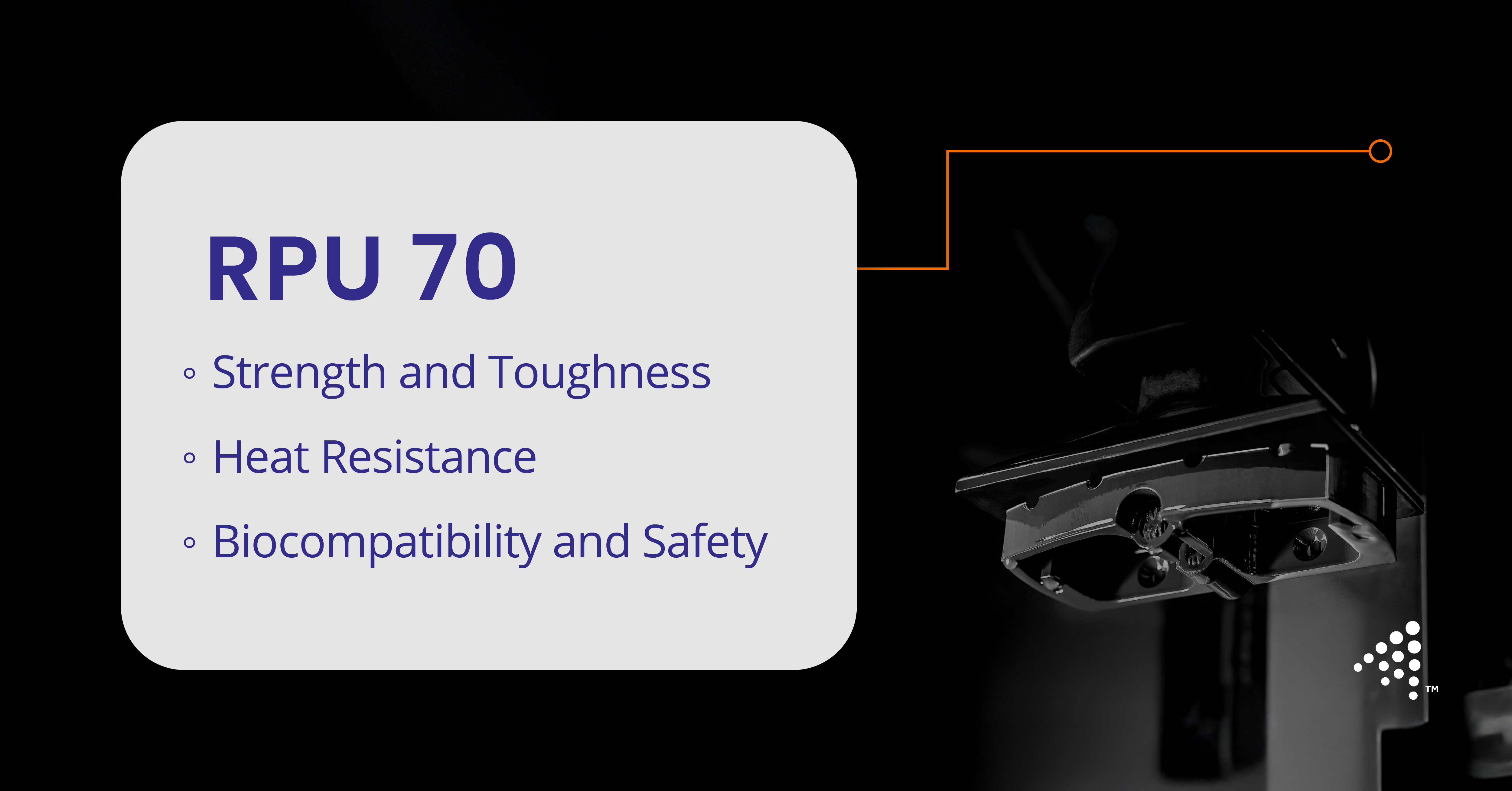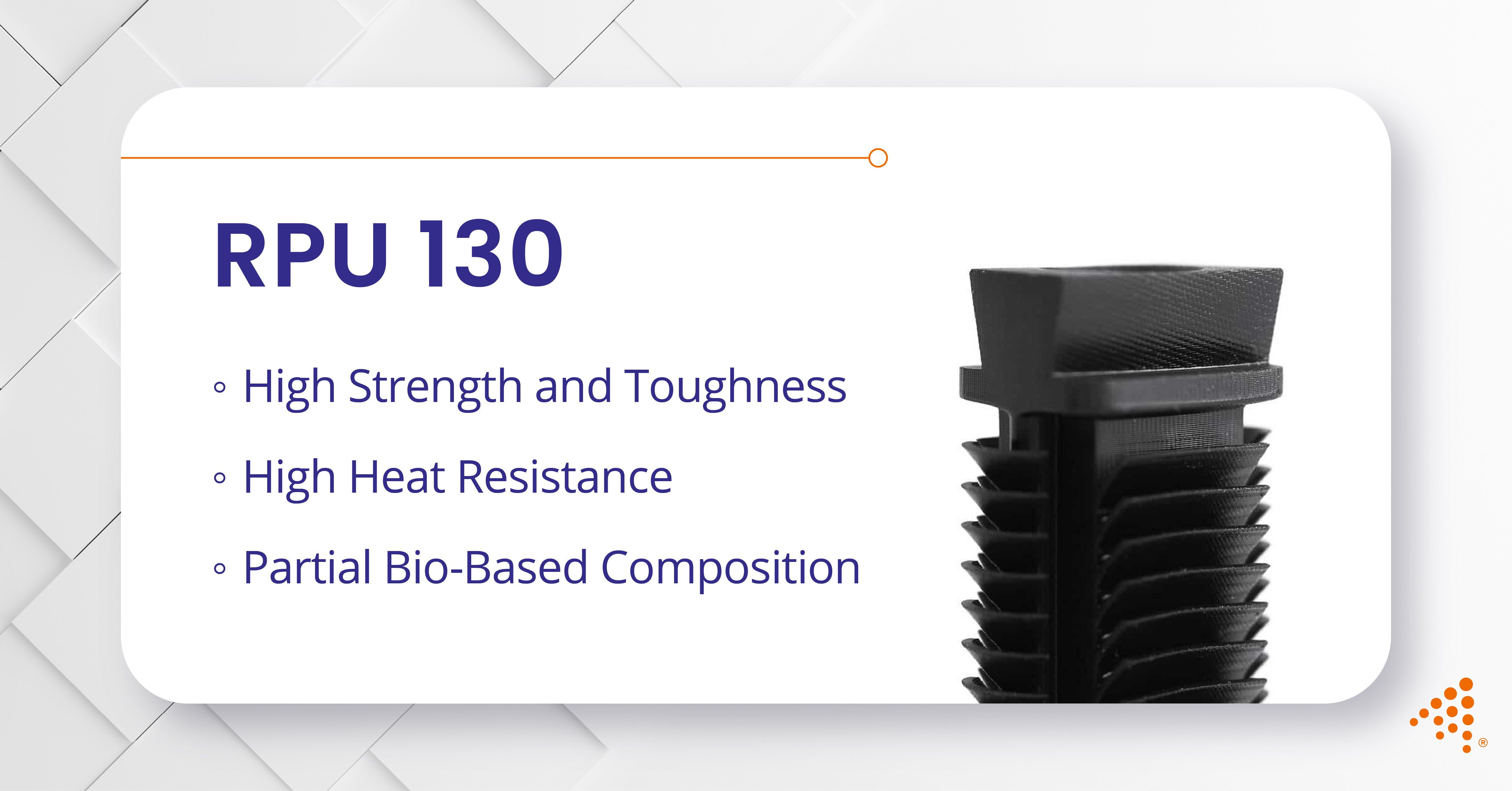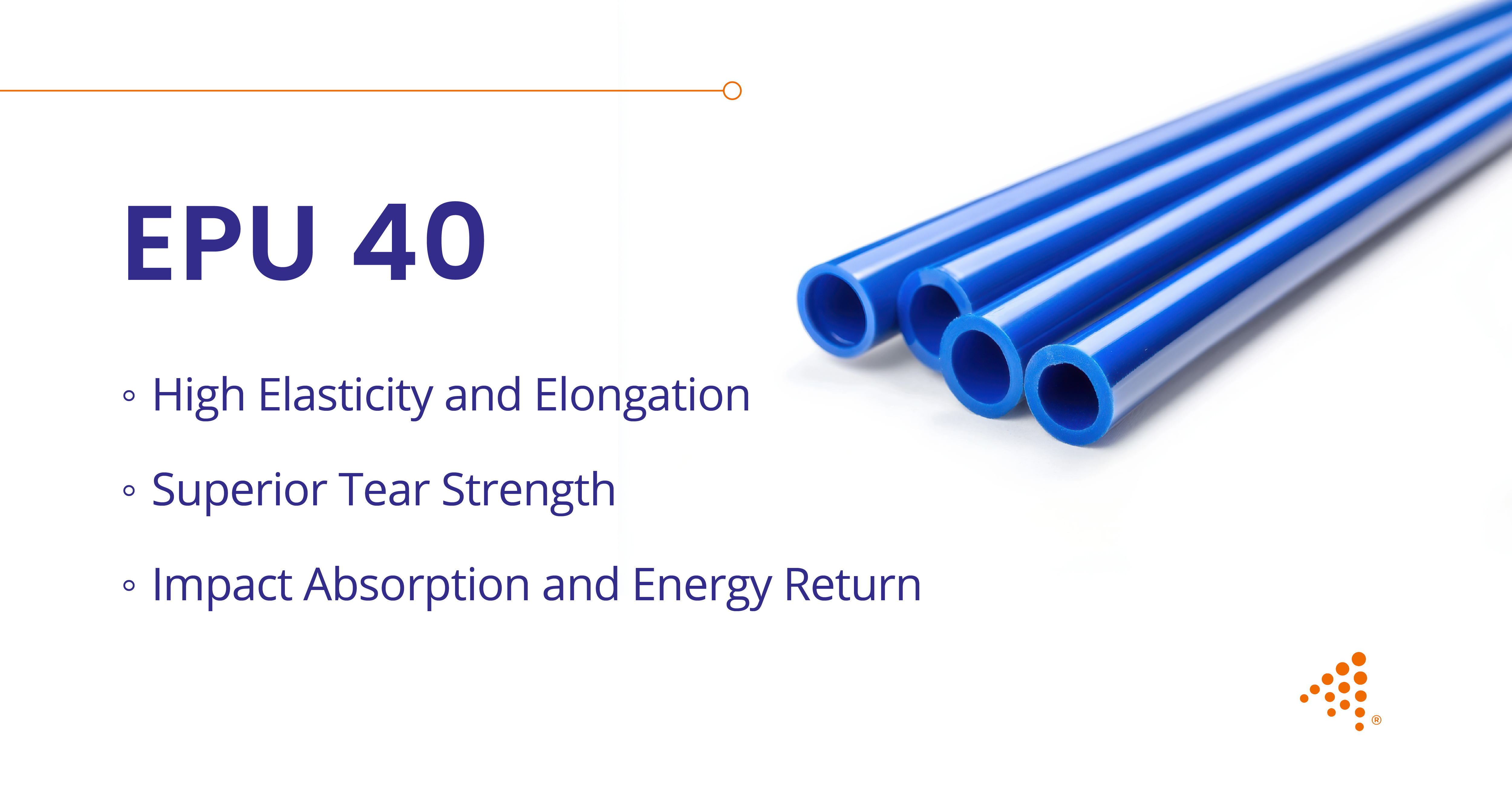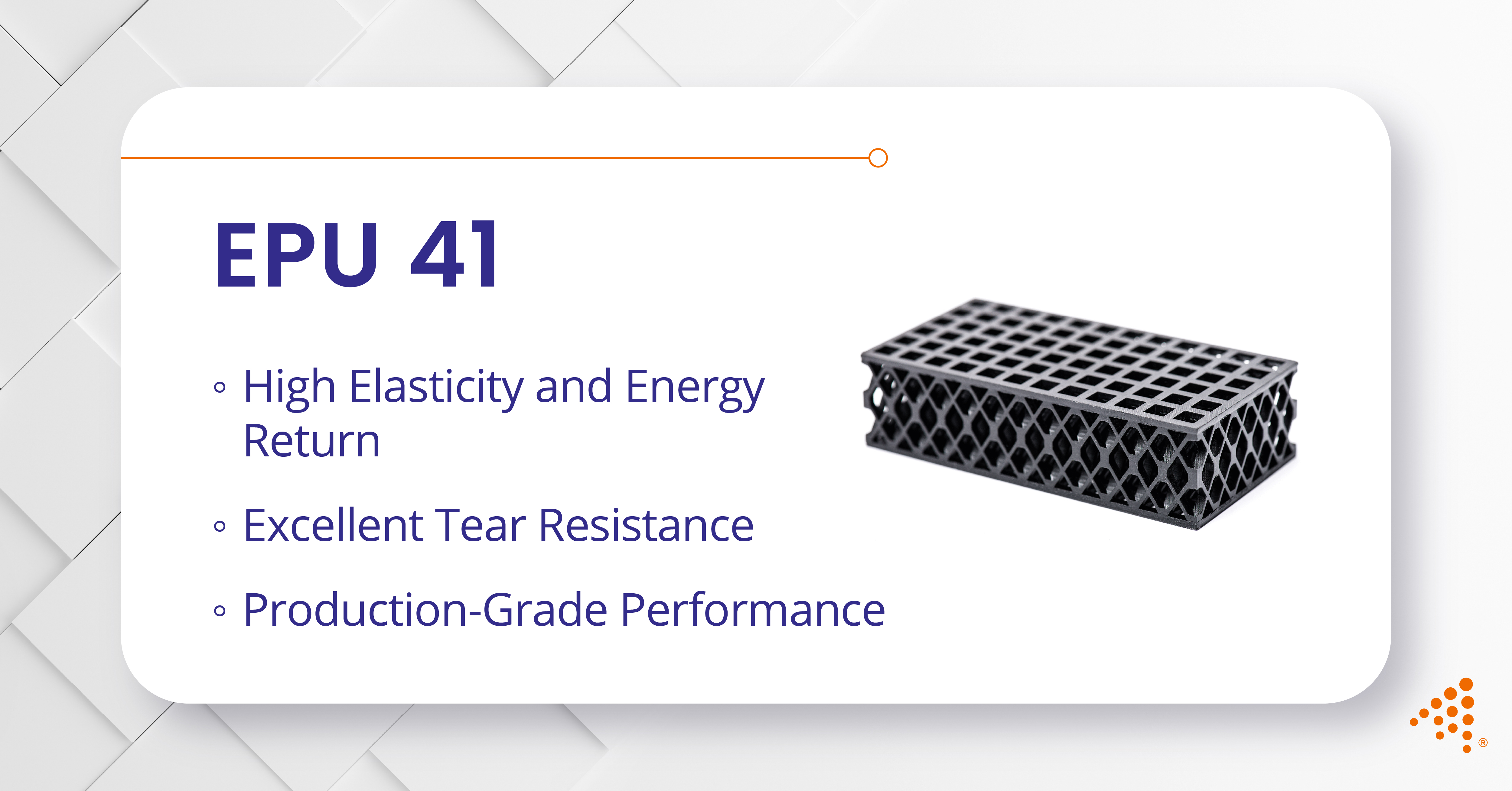RPU 130: High-Performance, Heat-Resistant Resin
Rigid Polyurethane 130 (RPU 130) is an engineering-grade material by Carbon used in additive manufacturing, specifically with Carbon's Digital...

Rigid Polyurethane (RPU) 70 by Carbon is a versatile and robust material used in Carbon's Digital Light Synthesis (DLS) additive manufacturing process. This two-part polyurethane resin is renowned for its exceptional combination of stiffness, strength, and durability, making it a preferred choice for producing functional prototypes and end-use parts across various industries. RPU 70 is engineered to perform comparably to common thermoplastics, providing a reliable solution for parts that demand high performance and a quality surface finish, bridging the gap between prototyping and full-scale production, including for those familiar with traditional methods like medical injection molding and plastic injection mold design services.
Read More About: Overcoming Injection Molding Challenges in Medical Design
RPU 70 is defined by a balanced profile of mechanical, thermal, and chemical properties that make it suitable for a wide range of demanding tasks.
One of the most notable attributes of RPU 70 is its combination of strength and toughness. It offers high tensile strength and a stiff modulus, allowing it to resist deformation under load. This makes it ideal for components that require structural integrity and durability. Despite its rigidity, it is not brittle and can withstand significant impact, providing a level of toughness that ensures parts can survive the rigors of real-world use without fracturing.
RPU 70 exhibits a heat deflection temperature of approximately 140°F (60°C). This moderate heat resistance is sufficient for many electronic enclosures, automotive components, and consumer products that operate in environments with elevated temperatures but do not require high-performance thermal stability. This property allows it to maintain its shape and mechanical integrity under moderate thermal loads.
Parts produced with RPU 70 using the Carbon DLS process feature an excellent, semi-gloss surface finish directly from the printer. This high-quality finish often reduces the need for extensive post-processing steps like sanding or painting, which can be critical for cosmetic components in consumer-facing products or for functional parts where surface texture is important.
RPU 70 has passed biocompatibility testing according to ISO 10993-5 and -10 standards, making it suitable for certain medical-adjacent uses, such as housings and fixtures. It also holds a UL 94 HB flame resistance classification, which is a horizontal burn rating, indicating that the material is slow-burning. These certifications expand its utility into markets with stringent safety and regulatory requirements, including those covered under DFM for medical devices and ISO-certified manufacturing.
The unique combination of properties found in RPU 70 lends itself to a broad spectrum of uses, from functional prototypes to production parts.
Due to its rigidity, toughness, and quality surface finish, RPU 70 is frequently used for custom housings and enclosures. This includes casings for consumer electronics, diagnostic equipment, and industrial devices. Its ability to create intricate features and a smooth finish makes it a superior choice for products where both aesthetics and protection are paramount.
In the automotive sector, RPU 70 is utilized for a variety of non-critical components such as brackets, clips, covers, and interior trim pieces. Its resistance to various automotive fluids and its dimensional stability under moderate heat make it a reliable material for parts that must endure the demanding automotive environment.
The material's durability makes it well-suited for industrial components like jigs, fixtures, and manufacturing aids. These parts must withstand repeated use and handling. The speed of the DLS process allows for rapid iteration and deployment of custom tooling, a significant advantage over the long lead times associated with traditional injection molding. It’s a compelling option for manufacturers looking to streamline design for injection molding (DfIM) and adopt additive manufacturing for production.
Want Injection Mold-Like Performance From 3D Printing?
Explore our additive manufacturing solutions using RPU 70 for durable, production-grade parts without tooling delays.
RPU 70 is frequently positioned as a direct additive manufacturing alternative to several workhorse thermoplastics used in traditional injection molding. Its performance profile makes it a strong competitor to materials like ABS, PMMA, and POM, offering similar functional capabilities but with the enhanced design freedom and speed of the Carbon DLS process.
A very common comparison is made between RPU 70 and Acrylonitrile Butadiene Styrene (ABS). Both materials provide a desirable balance of stiffness, strength, and toughness, making them suitable for a wide array of applications such as protective housings, automotive interior parts, and consumer goods. RPU 70 mirrors the rigidity and durability of ABS, making it an excellent choice for functional components that must withstand mechanical stress. For those accustomed to the performance of ABS, RPU 70 delivers a comparable outcome with the added benefit of producing isotropic parts, which possess uniform strength in all directions—a feat that can be challenging to achieve with conventional manufacturing methods.
RPU 70 also serves as an alternative to Polymethyl Methacrylate (PMMA), commonly known as acrylic. While PMMA is often selected for its exceptional optical clarity, its applications also extend to components where rigidity and a high-quality surface finish are critical. RPU 70 shares this high stiffness and can be finished to a very smooth, aesthetically pleasing surface. Although it does not offer the transparency of PMMA, in applications where RPU 70's black color is acceptable, it provides comparable rigidity and a superior toughness, making it less prone to brittle fracture than acrylic.
Furthermore, RPU 70 can be considered a substitute for Polyoxymethylene (POM), also known as acetal or Delrin. POM is renowned for its low friction, high stiffness, and excellent dimensional stability, making it a staple for precision mechanical parts like gears and bearings. RPU 70 emulates the stiffness and strength of POM, allowing it to be used for similar structural components and durable parts. While RPU 70 does not replicate the low-friction, self-lubricating properties of POM, it provides an advantage in producing highly complex geometries that would be difficult or costly to machine or mold from acetal. This makes it a valuable option for intricate assemblies and custom components where the primary requirements are strength and rigidity.
While RPU 70 is a highly capable material, it is important to understand its limitations to select it for the right purpose.
Although it has a respectable heat deflection temperature for many scenarios, RPU 70 is not intended for high-temperature environments. For components that will be exposed to temperatures consistently above 140°F (60°C), other materials with higher thermal stability, such as Carbon's EPX 82 or CE 221, would be more appropriate choices.
While RPU 70 is resistant to many common chemicals, it can be susceptible to degradation from prolonged exposure to harsh solvents or UV radiation. For outdoor parts or those in chemically aggressive environments, careful testing is recommended, or a more resistant material should be considered. The standard black color offers some inherent UV protection, but long-term exposure can still affect its properties and appearance.
Read More About: UMA 90: Quick-Printing, Color-Mixable Rigid Resin
Choosing RPU 70 is a strategic decision for projects that require a balance of performance, aesthetics, and production flexibility. It is an ideal material for creating production-grade parts with mechanical properties that rival those of common injection molding plastics like ABS, PMMA, and POM. The ability to move from prototype to production on the same platform without a significant investment in tooling is a transformative advantage, drastically reducing lead times and enabling on-demand manufacturing.
For product developers, especially in fields that demand high precision like medical device prototypes, RPU 70 offers the chance to produce complex geometries that would be difficult or impossible to achieve with conventional methods. Its proven biocompatibility and UL 94 HB rating provide confidence for use in a variety of consumer and industrial products. Ultimately, RPU 70 empowers designers and engineers to create durable, beautiful parts with the speed and flexibility of additive manufacturing services.
You can also view our Material Selection tool.

Rigid Polyurethane 130 (RPU 130) is an engineering-grade material by Carbon used in additive manufacturing, specifically with Carbon's Digital...

Elastomeric Polyurethane (EPU 40) is a high-performance additive manufacturing material developed by Carbon, renowned for its unique combination of...

Elastomeric Polyurethane (EPU 41) is a versatile, production-grade additive manufacturing resin developed by Carbon. It is engineered to deliver...